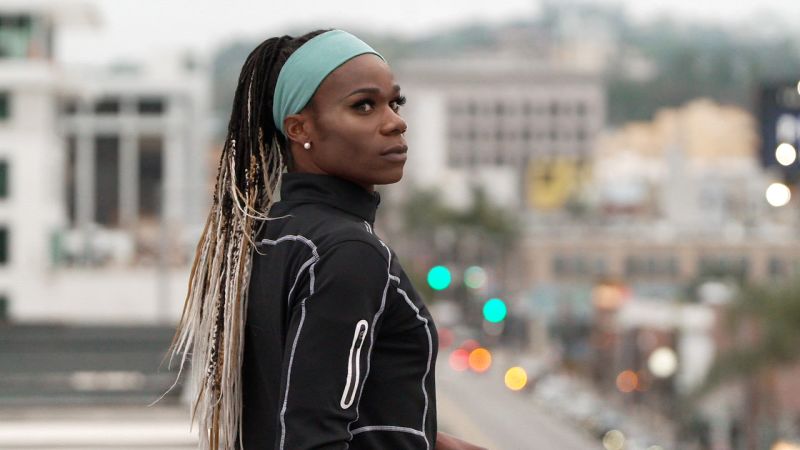As a transgender athlete, CeCé Telfer is used to fighting for acceptance, both on the sports field and in her day-to-day life. That battle, she says, has become even more challenging in the weeks since President Donald Trump’s inauguration.
“I’m Black, I’m a woman, I’m transgender, and I’m an athlete,” Telfer tells CNN Sport. “Each of my identities is a target, especially in America.”
Six years ago, Telfer became the first out, transgender athlete to win an NCAA title when she took victory in the Division II 400-meter hurdles event. That moment seems like a lifetime ago, with her hopes of pursuing a career in track and field suffering setback after setback since then.
Unable to compete in female world rankings competitions due to the current rules from the sport’s governing body, Telfer’s dreams of becoming an Olympian are currently on hold. Now, Trump’s executive order banning transgender women from competing in women’s sports has further reinforced her sense of ostracization.
“I feel like a lot of the anti-trans rhetoric has become louder, more in my face,” Telfer said when asked how her life has changed in recent weeks. “Prior to this set-in-stone administration, I woke up every day and I faced adversaries when I (left) my house. Now, I wake up every day and I have to make sure that I make it home alive.”
Trump’s executive order, entitled “Keeping Men Out of Women’s Sports,” is part of his administration’s wider attempts to limit transgender rights. In the first week of his second term, Trump also signed an executive order preventing transgender people from serving in the military. The order is facing a legal fight brought on by six transgender service members and two transgender people who want to enlist.
As for Telfer, she likes to remind herself that “policies and orders are not forever” – even as they continue to marginalize the trans community – “but our resilience is.”
She adds: “I’m willing to sit down with anybody who’s willing to have this conversation – even the Trump administration, Trump himself – if he wants to sit down with me and talk and have a human conversation and see me.”
Her message to the president? “I need some explanation as to why you want to completely eradicate us from society when we’ve done nothing wrong,” says Telfer. “Think about the humanity and think about the younger kids like me who have doctors confirming their gender, have people behind them to support them.”
Earlier this month, a day after Trump’s executive order, the NCAA changed its participation policy for transgender athletes in women’s sports, limiting competition to athletes assigned female at birth only.
Under the new policy, an athlete assigned female at birth who has begun hormone therapy can practice with a women’s team but cannot compete on a women’s team without risking the team’s eligibility for championships.
This is far more stringent than the NCAA’s previous stance adopted in 2022. That took a case-by-case approach, with each sport’s national governing body ruling on the participation of trans and other gender-diverse people.
“I definitely felt as though they were pressured to make this decision,” Telfer said when asked about the NCAA’s policy coming on the heels of Trump signing the executive order.
“They won’t allow transgender female athletes to compete (in female categories); however, they will allow transgender female athletes to practice with their teams. (That’s) just a little bit contradicting in itself because you’re teasing us, you’re telling us that we’re allowed to practice, we’re allowed to feel like who we are, but when it comes to competition and actually executing what we’ve worked, blood, sweat, and tears for, we can’t do so.”
CNN has contacted the NCAA for comment regarding the new policy.
In light of the change, the Department of Education wrote to the NCAA calling for records and titles held by trans women in women’s competitions, which would include Telfer’s 400m hurdles victory in 2019, to be rescinded. It would also affect swimmer Lia Thomas, who became the first out, transgender athlete to win an NCAA Division I title in March 2022.
“That’s not how history works,” is Telfer’s response to the Department of Education’s letter. “You can’t take back history.”
Currently working part-time while she continues to chase her sporting dreams, Telfer hasn’t completely given up on her hopes of competing at the 2028 Olympics, which will be held in her hometown of Los Angeles.
In the first instance, governing body World Athletics would have to radically change its policy towards transgender women competing in female categories, enabling Telfer to race in events sanctioned by the organization.
“If there’s still a chance, even the slightest one in a million, there’s still that one chance, and I’m willing to take it,” says Telfer. “I’m ready, I’m willing, and I’m able, so if any coach out there is watching this, CeCé is ready and all she needs is that chance.”





